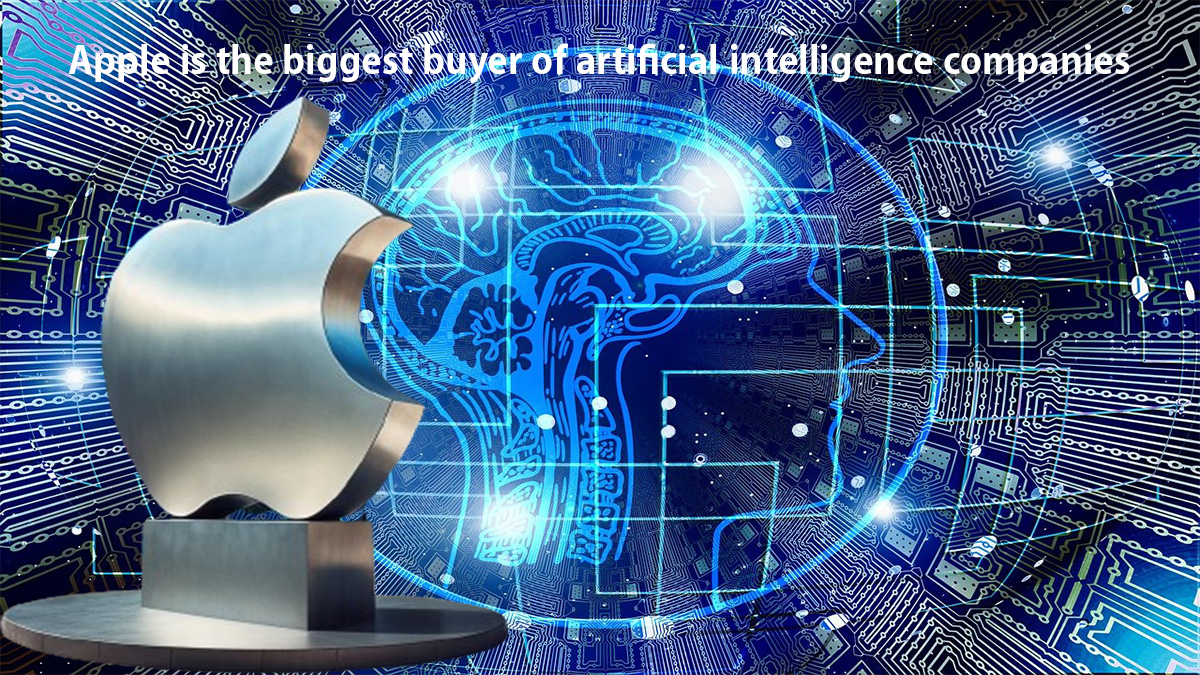Apple is the biggest buyer of artificial intelligence companies

Apple may not be making a lot of noise about their involvement in the AI space, but behind the scenes, they are quietly acquiring some of the biggest AI companies in the industry. In fact, Apple is currently the largest buyer of AI companies, with a focus on enhancing their products and services with cutting-edge technology.
By strategically acquiring these companies, Apple is positioning themselves as a major player in the AI space, allowing them to stay ahead of the competition and continue to innovate. This move also allows Apple to integrate AI technology into their existing products, such as Siri and facial recognition software.
While other tech giants like Google and Facebook are more vocal about their AI efforts, Apple’s approach of quietly acquiring top talent and technology speaks volumes about their commitment to staying at the forefront of innovation. With their deep pockets and dedication to excellence, it’s clear that Apple is serious about harnessing the power of artificial intelligence for future growth and success.
Microsoft and Google haven’t bought as many AI companies as Apple
When it comes to the world of artificial intelligence (AI), two tech giants stand out: Microsoft and Google. Both companies have been vocal about their commitment to AI research and development, touting the potential benefits it can bring to society. However, when it comes to acquiring startups in the AI space, Apple has been leading the pack.
While Microsoft and Google have made significant investments in AI through internal research and development, they have not been as active in acquiring AI startups as Apple. This raises questions about their strategies for staying ahead in the rapidly evolving field of AI.
Apple’s acquisition of several AI startups, such as Turi and Emotient, has allowed them to integrate cutting-edge technology into their products and services. By bringing in top talent and innovative technologies from these startups, Apple has positioned itself as a leader in AI innovation.
On the other hand, Microsoft and Google may be focusing more on developing their own AI capabilities internally rather than relying on acquisitions. While this approach can be effective in some cases, it may also limit their ability to quickly adapt to new trends and technologies in the fast-paced world of AI.
While Microsoft and Google talk a big game when it comes to AI, Apple’s strategic acquisitions of AI startups have given them a competitive edge in this rapidly evolving field. It will be interesting to see how these tech giants continue to navigate the complex landscape of artificial intelligence in the years to come.
Apple’s Focus on Running AI Through Mobile Devices
According to the report, Apple has been actively working on addressing the technological challenge of running artificial intelligence (AI) through mobile devices. This is a significant step for the tech giant, as AI capabilities are becoming increasingly important in today’s digital world.
- In order to enhance its AI capabilities, Apple has acquired several AI-related startups. The most recent acquisition took place early last year when Apple purchased Wave One, a California-based company that specializes in AI-powered video compression technology.
- By acquiring Wave One and other AI startups, Apple is positioning itself as a leader in incorporating AI into its mobile devices. This move will not only improve the user experience but also open up new possibilities for innovative features and applications.
- With this focus on running AI through mobile devices, Apple is demonstrating its commitment to staying at the forefront of technological advancements. As consumers continue to rely on their smartphones and tablets for everyday tasks, integrating AI into these devices will be crucial for providing a seamless and efficient user experience.
- Apple’s efforts to tackle the technological challenge of running AI through mobile devices are a clear indication of the company’s dedication to innovation and staying ahead of the curve in the rapidly evolving tech industry.
a recent research note from Morgan Stanley
In a recent research note from Morgan Stanley, it was revealed that nearly half of Apple’s AI job postings have mentioned the term “Deep learning.” This term refers to the advanced algorithms that drive generative AI technology.
Deep learning is a subset of machine learning that involves training artificial neural networks on large amounts of data to make predictions or decisions without being explicitly programmed. This technology has revolutionized the field of AI and is at the core of many cutting-edge applications, such as image recognition, natural language processing, and autonomous driving.
By emphasizing deep learning in their job postings, Apple is signaling their commitment to staying at the forefront of AI innovation. This focus on advanced algorithms suggests that Apple is looking to develop more sophisticated AI capabilities in areas such as Siri, facial recognition, and predictive analytics.
Overall, Apple’s emphasis on deep learning in their AI job posts highlights the importance of this technology in shaping the future of artificial intelligence. As one of the leading tech companies in the world, Apple’s investment in deep learning signals a significant step forward in advancing AI capabilities across various industries.
Apple’s “Ajax” Large Language Model: A Game-Changer in On-Device AI
Recent reports have revealed that Apple has been quietly testing its own large language model (LLM) named “Ajax” since early 2023. Unlike other LLMs such as OpenAI’s ChatGPT, Apple’s primary focus with Ajax is to develop generative AI that can work locally on-device, rather than relying on cloud services in data centers.
This approach marks a significant shift in the AI landscape, as it allows for more privacy and security by keeping user data on the device itself. With Ajax, users can enjoy the benefits of a powerful language model without sacrificing their personal information to external servers.
Apple’s commitment to on-device AI is evident in its efforts to push the boundaries of what is possible with machine learning. By harnessing the power of Ajax, Apple aims to provide users with a seamless and intuitive experience that is both efficient and secure.
The development of Ajax represents a new era in artificial intelligence, where privacy and performance go hand in hand. As Apple continues to refine and optimize its on-device AI capabilities, we can expect to see even more groundbreaking innovations that will shape the future of technology.
The challenge in achieving the aim involves optimizing the LLM
The challenge of optimizing the LLM while reducing its size and relying on high-performance mobile hardware and faster Apple silicon chips is a complex one. Apple’s plan to upgrade the iPhone 16 microphone for an improved AI-enhanced Siri experience is a bold move in this direction.
By focusing on improving the LLM’s efficiency and performance, Apple can ensure that its devices remain at the forefront of technology. The use of high-performance mobile hardware and faster Apple silicon chips will enable smoother operation and better overall user experience.
The upgrade to the iPhone 16 microphone is particularly exciting, as it will enhance the functionality of Siri, making it even more responsive and intelligent. This AI-enhanced Siri experience will revolutionize how users interact with their devices, opening up new possibilities for productivity and convenience.
The challenge of optimizing the LLM while reducing its size and relying on high-performance hardware is a significant one. However, with Apple’s commitment to innovation and cutting-edge technology, we can expect exciting developments in the near future that will further enhance the user experience.
Apple AI researchers said they have made a key breakthrough in deploying large language models (LLMs) on iPhones
Apple AI researchers recently announced a major advancement in the deployment of large language models (LLMs) on iPhones and other Apple devices with limited memory.
This breakthrough involves the development of a groundbreaking flash memory utilization technique that allows for more efficient storage and processing of complex language models.
By optimizing how data is stored and accessed in flash memory, Apple’s new technique enables devices with limited memory to run sophisticated language models without sacrificing performance or speed.
This innovation opens up a world of possibilities for AI applications on mobile devices, making it easier than ever to interact with intelligent virtual assistants, translate languages on-the-go, and perform other advanced tasks that require powerful language processing capabilities.
With this new breakthrough, Apple is pushing the boundaries of what is possible in terms of AI technology on mobile devices. By leveraging innovative techniques like flash memory utilization, the company is paving the way for a future where smartphones and tablets can handle even more complex AI tasks with ease.
This development represents a significant step forward in making cutting-edge AI technology accessible to a wider audience, ultimately enhancing the user experience and opening up new opportunities for innovation in the mobile space.







